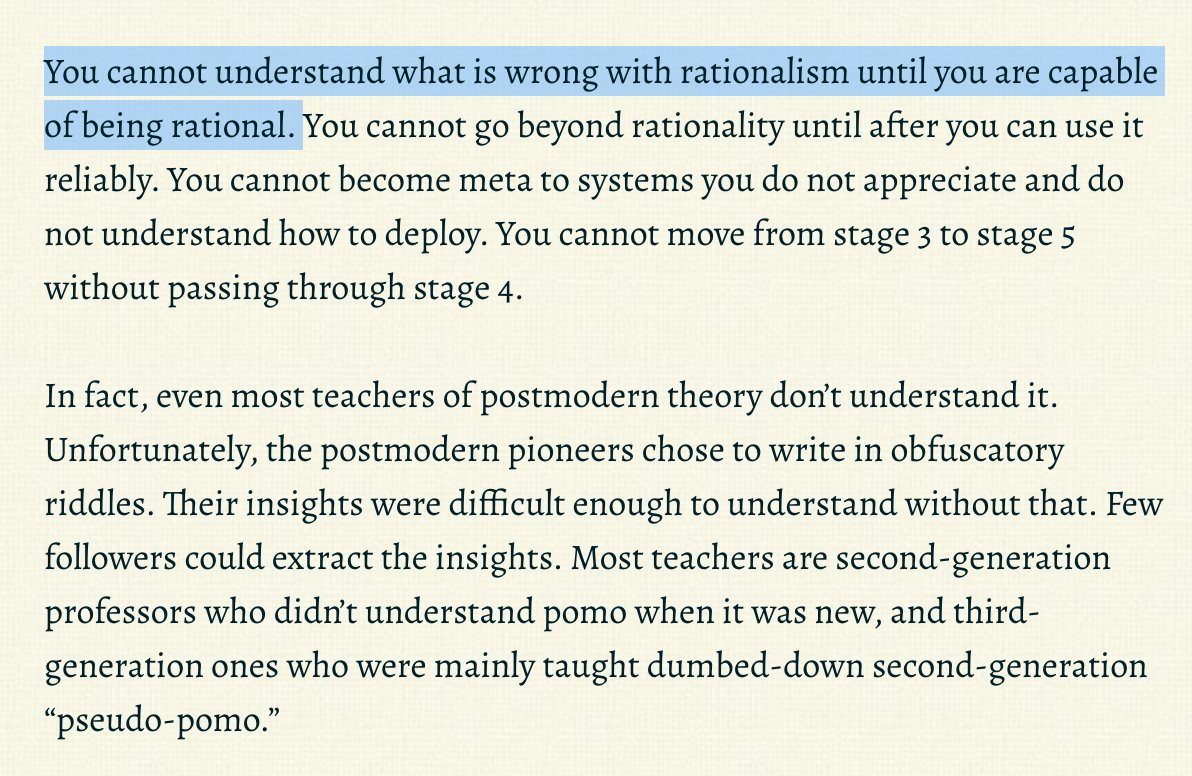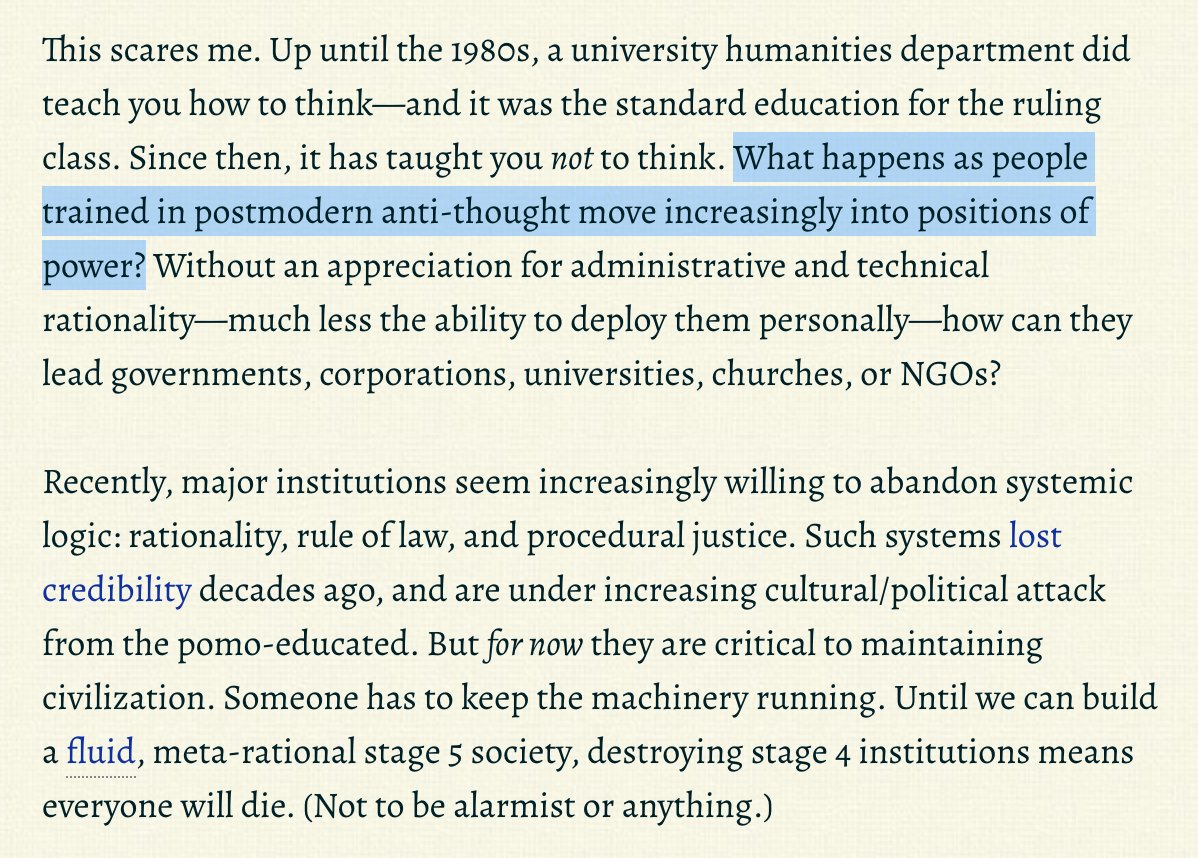
@micahtredding @meditationstuff @nosilverv @Morphenius @JakeOrthwein I haven’t read any of this except the white-on-gray quoted text block, and not sure you were asking me, but, fwiw, from my (imperfect) understanding of Dzogchen (spelled rDzogs Chen) in that text block—that’s the transliteration, “Dzogchen” is the pronunciation)…
@micahtredding @meditationstuff @nosilverv @Morphenius @JakeOrthwein … your summary is somewhat off, an a way that is natural given the broader understanding of meditation and non-duality in America currently.
I have some minor quibbles with the quoted text block, plus a main one that you picked up on.
I have some minor quibbles with the quoted text block, plus a main one that you picked up on.
@micahtredding @meditationstuff @nosilverv @Morphenius @JakeOrthwein It equates non-duality / enlightenment with absence of a self / other boundary. This is not the view of Dzogchen.
(This view in current America probably comes from modernist Zen…
vividness.live/2011/07/02/zen…
(This view in current America probably comes from modernist Zen…
vividness.live/2011/07/02/zen…
@micahtredding @meditationstuff @nosilverv @Morphenius @JakeOrthwein … which merged German Romantic Idealism with … probably? … some actual Zen)
“No self/other boundary” is *one* understanding of enlightenment within Buddhism. It’s not wrong… It’s incomplete…
vividness.live/2011/10/06/who…
“No self/other boundary” is *one* understanding of enlightenment within Buddhism. It’s not wrong… It’s incomplete…
vividness.live/2011/10/06/who…
@micahtredding @meditationstuff @nosilverv @Morphenius @JakeOrthwein “No self/other boundary” is a form of monism, which is (a) obviously false, and (b) harmful
meaningness.com/monism-dualism…
meaningness.com/monism-dualism…
@micahtredding @meditationstuff @nosilverv @Morphenius @JakeOrthwein There are many radically different conceptions of enlightenment within Buddhism…
vividness.live/2012/09/13/epi…
vividness.live/2012/09/13/epi…
@micahtredding @meditationstuff @nosilverv @Morphenius @JakeOrthwein Oh, backing up one step, here’s a take on the relationship between self and other (“inside” and “outside,” “mind” and “world”) that is non-dual in roughly the Dzogchen sense of “neither separable nor the same”:
meaningness.com/self
meaningness.com/self
@micahtredding @meditationstuff @nosilverv @Morphenius @JakeOrthwein The quoted text speaks of “absence of separation,” which is accurate, but it’s easy to misunderstand as “identical,” which is wrong.
(So my biggest quibble is not what it says but with what it doesn’t say, but imo should have! Maybe the author(s) say this somewhere else.)
(So my biggest quibble is not what it says but with what it doesn’t say, but imo should have! Maybe the author(s) say this somewhere else.)
@micahtredding @meditationstuff @nosilverv @Morphenius @JakeOrthwein Let’s take a step back and examine “non-duality.”
Wherever this term is used, it’s helpful to ask: “in this context, what thing is asserted to be ‘not dual’ with what other thing?” And: “If these things are ‘not dual,’ what *is* their relationship?”
Wherever this term is used, it’s helpful to ask: “in this context, what thing is asserted to be ‘not dual’ with what other thing?” And: “If these things are ‘not dual,’ what *is* their relationship?”
@micahtredding @meditationstuff @nosilverv @Morphenius @JakeOrthwein These are the sorts of picky questions STEM-educated people like to ask & Romantic people hate. I am a STEM-educated person.
I find reluctance to ask these questions is often based on an eternalistic hope “enlightenment” will magically solve all problems
meaningness.com/hope
I find reluctance to ask these questions is often based on an eternalistic hope “enlightenment” will magically solve all problems
meaningness.com/hope
@micahtredding @meditationstuff @nosilverv @Morphenius @JakeOrthwein Generally speaking, in Dzogchen, “non-duality” means “neither separate nor identical”; and then the details of what that means needs to be worked out in particular situations.
@micahtredding @meditationstuff @nosilverv @Morphenius @JakeOrthwein Specifically, in Dzogchen, the main things asserted to be non-dual are: duality and non-duality.
That probably sounds like nonsense on first reading.
It *can* be understood intellectually. Doing so may be useful.
It’s easier to approach through meditation experience, however.
That probably sounds like nonsense on first reading.
It *can* be understood intellectually. Doing so may be useful.
It’s easier to approach through meditation experience, however.
@micahtredding @meditationstuff @nosilverv @Morphenius @JakeOrthwein The Western rationalist tradition is “mentalistic.” It drew an increasingly sharp distinction between mental and physical things, culminating in Descartes’ dualism.
@micahtredding @meditationstuff @nosilverv @Morphenius @JakeOrthwein That is unworkable, so the apparent alternatives are two forms of monism: physicalism (mental things are really physical things) and Idealism (physical things are really mental things).
@micahtredding @meditationstuff @nosilverv @Morphenius @JakeOrthwein Both are also unworkable, and the last hundred years has seen a series of failed combinations and compromises between them. E.g.:
Representationalism: things-in-the-head somehow interact causally with non-physical things that bear meaning (“propositions”) meaningness.com/eggplant/propo…
Representationalism: things-in-the-head somehow interact causally with non-physical things that bear meaning (“propositions”) meaningness.com/eggplant/propo…
@micahtredding @meditationstuff @nosilverv @Morphenius @JakeOrthwein A particularly pernicious brand of representationalism holds that, since the mind is just a sessile heap of representations which a machine chews up to make other representations, we have no actual contact with the world. We live inside a “mental simulation” instead…
@micahtredding @meditationstuff @nosilverv @Morphenius @JakeOrthwein Representationalism began as an attempt to work out physicalist monism, but at this point it flips into Idealism instead. There is no objective world (other than maybe the quantum world). The commonsense world of bicycles and eggplants is an illusion produced by our minds.
@micahtredding @meditationstuff @nosilverv @Morphenius @JakeOrthwein “All apparent reality is an illusion, and realizing this is enlightenment” is one genuinely Buddhist account. It’s probably not the same view as the cogsci “we have no direct access to reality” view, although it sounds similar.
@micahtredding @meditationstuff @nosilverv @Morphenius @JakeOrthwein It is also not quite the Dzogchen view, although you can find similar-sounding statements frequently in Dzogchen texts.
“Illusion” normally contrasts with “reality.” For wrongheaded physicalism, the illusion that there are eggplants contrasts with the reality of quanta…
“Illusion” normally contrasts with “reality.” For wrongheaded physicalism, the illusion that there are eggplants contrasts with the reality of quanta…
@micahtredding @meditationstuff @nosilverv @Morphenius @JakeOrthwein In many Mahayana texts, the illusion that there are eggplants contrasts with the reality that there is only emptiness. Dzogchen rejects this dualism.
Dzogchen also rejects the Tantrayana view that the illusion of the mundane world contrasts with the reality of the pure realm.
Dzogchen also rejects the Tantrayana view that the illusion of the mundane world contrasts with the reality of the pure realm.
@micahtredding @meditationstuff @nosilverv @Morphenius @JakeOrthwein Modernist meditation methods (worked out in Burma and Japan, mid-20th century) aim for an experience of sudden dramatic collapse of self/other dualism. That is equated with “enlightenment.”
This experience can be valuable (and risky). However, it’s potentially misleading…
This experience can be valuable (and risky). However, it’s potentially misleading…
@micahtredding @meditationstuff @nosilverv @Morphenius @JakeOrthwein As a practice approach, Dzogchen’s “neither the same nor different” might involve allowing the details of what that means to evolve in particular activities as you engage in them.
@micahtredding @meditationstuff @nosilverv @Morphenius @JakeOrthwein The preliminary meditation exercises may reveal that self and other are more and less separate in experience at different times.
Relevant here is Heidegger’s discussion of builders putting up a wall. Mostly when you are hammering away at it, there’s no particular self or other!
Relevant here is Heidegger’s discussion of builders putting up a wall. Mostly when you are hammering away at it, there’s no particular self or other!
@micahtredding @meditationstuff @nosilverv @Morphenius @JakeOrthwein It’s mostly only when you whack your thumb or the hammer head breaks off that “self” and “other” appear in experience as noticeable and distinct.
@micahtredding @meditationstuff @nosilverv @Morphenius @JakeOrthwein We always already have the natural experience of immersion in interactive activity in which self and other are non-dual.
A dramatic “enlightenment experience” highlights this, makes it powerfully obvious, and motivates you to continue. It’s not in itself the point…
A dramatic “enlightenment experience” highlights this, makes it powerfully obvious, and motivates you to continue. It’s not in itself the point…
@micahtredding @meditationstuff @nosilverv @Morphenius @JakeOrthwein The gray text block uses the term “objective reality,” which, inasmuch as it is correct, implies that an interpretation of it as “everything is really subjective, just a mental simulation” couldn’t be right.
“Objective” is trying to communicate something, but word is unfortunate
“Objective” is trying to communicate something, but word is unfortunate
@micahtredding @meditationstuff @nosilverv @Morphenius @JakeOrthwein Objective and subjective are concepts that don’t have exact equivalents in Buddhism. It’s not that Buddhism asserts that they are the same, or that only one of them is real, it’s that the distinction just doesn’t fit.
The obj/subj dualism is pernicious: meaningness.com/objective-subj…
The obj/subj dualism is pernicious: meaningness.com/objective-subj…
• • •
Missing some Tweet in this thread? You can try to
force a refresh





